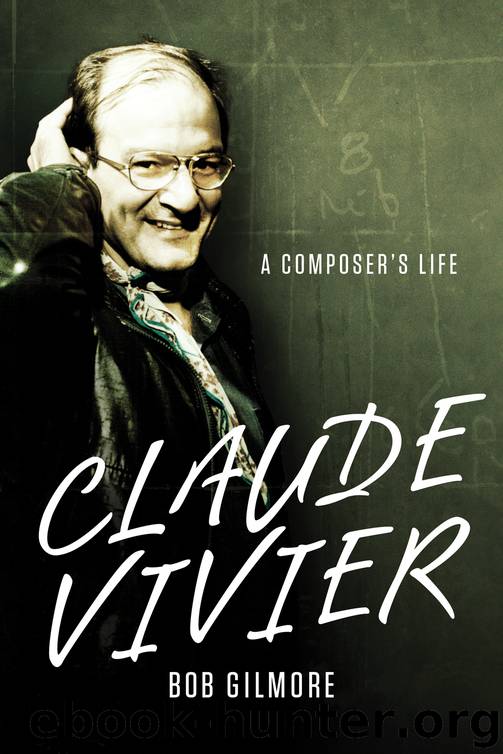Claude Vivier by Gilmore Bob

Author:Gilmore, Bob
Language: eng
Format: epub
Publisher: Boydell & Brewer Group Ltd
Published: 2014-05-09T16:00:00+00:00
Our image of Vivier as he approached his thirtieth birthday in April 1978 is that of a mature composer of vision and drive, with an already impressive catalog of works, who had outgrown the uncertainties of his student years and now spoke and wrote with an ever-increasing sense of artistic confidence and self-belief. Gilles Tremblay came to feel that Vivier was no longer showing him new pieces as a student to a teacher, but one to one, as colleagues. “And he always spoke with marvellous words about his own music.”31 Vivier, Tremblay remarks, was the only freelance composer in Montreal—“but he was a bachelor; still, I think everybody admired him to have the courage to do it.” That sense of confidence is publicly apparent in the article “Introspection d’un compositeur,” published that year in the short-lived Montreal magazine Sortir, edited by Luc Benoit, Paul Chamberland, Georges Khal, and Jean Basile. Although short, this text—already quoted in chapter 1—is the most revealing autobiographical writing of Vivier we possess. Essentially a retrospection of his childhood and adolescence, it also amounts to Vivier’s public coming out as a homosexual. It ends with the affirmation: “A single law governs my music: love. And it’s also this simple law that should govern our human relationships.”32
This sense of confidence is also apparent in an interview he recorded with Yves Bouliane in February. He spoke about his ambivalent feelings about postwar serialism and about the need to rethink the concepts of harmony, melody, and counterpoint. He spoke too about the problems of communication, noting something profound about his own music in his remark: “Perhaps solitude is finally the element that I express the most in my music.”33 Going further, the mystical Vivier—the composer of Musik für das Ende and Journal—speaks to us in this extraordinary comment: “Each person can create their own universe, sonic as well as visual, you know. But at a certain moment, we will no longer have a body. We will be beings . . . pure spirits. That moment will be extraordinary. We will be capable of, of . . . of seeing a music that is much more subtle.” And: “My whole existence I accept completely. I also accept that I feel an urgency to write, because it is an urgency. I must write music. I am an écriveux [writer] of music.”
Part of this increasing sense of maturity showed itself in his wish not merely to fit into the new music world in Montreal but to begin to shape it. On February 17, the Quebec premiere of Chants was given at the Nocturnales series at the Faculty of Music of the University of Montreal, with a group of student singers directed by Lorraine Vaillancourt, younger sister of the soprano Pauline Vaillancourt.34 According to John Rea, who was present, it was the “tremendous vibration,” the “magical quality” of that evening at the Nocturnales—the performance beginning at 11:00 p.m.—that led to the idea to perpetuate that feeling somehow. Driving home afterward with José Evangelista,
Download
This site does not store any files on its server. We only index and link to content provided by other sites. Please contact the content providers to delete copyright contents if any and email us, we'll remove relevant links or contents immediately.
| Actors & Entertainers | Artists, Architects & Photographers |
| Authors | Composers & Musicians |
| Dancers | Movie Directors |
| Television Performers | Theatre |
Cecilia; Or, Memoirs of an Heiress — Volume 2 by Fanny Burney(31954)
Cecilia; Or, Memoirs of an Heiress — Volume 3 by Fanny Burney(31936)
Fanny Burney by Claire Harman(26598)
We're Going to Need More Wine by Gabrielle Union(19041)
Plagued by Fire by Paul Hendrickson(17409)
All the Missing Girls by Megan Miranda(15989)
Cat's cradle by Kurt Vonnegut(15345)
Bombshells: Glamour Girls of a Lifetime by Sullivan Steve(14065)
For the Love of Europe by Rick Steves(14000)
Leonardo da Vinci by Walter Isaacson(13324)
4 3 2 1: A Novel by Paul Auster(12384)
The remains of the day by Kazuo Ishiguro(8990)
Adultolescence by Gabbie Hanna(8926)
Note to Self by Connor Franta(7667)
Diary of a Player by Brad Paisley(7566)
Giovanni's Room by James Baldwin(7334)
What Does This Button Do? by Bruce Dickinson(6201)
Ego Is the Enemy by Ryan Holiday(5432)
Born a Crime by Trevor Noah(5379)
